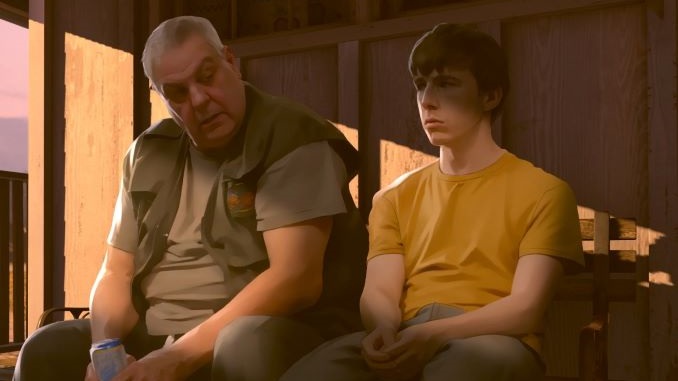As Dusk Falls Dares You To Take the Path Less Traveled, Then Do It Again

One moment can change the course of your life. A car accident can transform a cross-country road trip into the nexus point tying two disparate families together forever. As the past unravels into the present (and even into the future), Interior Night’s debut game As Dusk Falls tasks players with doing their best to survive the aftermath of their decisions. What happens to Vince and his family, Jay and his brothers, even Paul and his cousin the Sheriff, all rest on what you believe is the best course of action.
The game starts by mashing together clichés: a family moving cross country gets held hostage by three down-on-their-luck brothers who decided it was a good idea to rob from their local Sheriff. Your goal is to keep everyone alive throughout the night while slowly learning the root causes that led to this armed predicament in the first place. Desperate times and all, right? The main characters—a family man focused on protecting his loved ones and an odd-ball unsure of his place in his blue-collar family—are tropes tried and true. You shouldn’t care.
But that’s what’s so odd about As Dusk Falls is that you do care. You’ve seen everything it does before, but somehow you can’t stop playing until you reach the end. We know the characters with emotional baggage portrayed by sometimes questionable voice actors, the tools of Quick-Time Events (QTEs) and dialogue choices that help keep the player immersed, and the confrontational ending where the characters reminisce about the true nature of humanity. It should be a dime a dozen narrative adventure, and in many cases it falls into the exact same pitfalls you’ve seen before, but it somehow continually rises above its station.
From start to end, As Dusk Falls is all about moments—small interactions full of humanity that ground the flawed ambition of the experience and make the sum of the parts almost greater than the whole. The cliffhanger that the first half ends on—the narrative is charmingly divided into two books, Collision and Expansion—will be burned into my memory for a long time, both for its sheer audacity and how it pushes everything into new directions. It’s not a perfect package, but it’s one that will engross you for its entire seven hour playtime while dangling its many loose threads to entice you into yet another playthrough.
As Dusk Falls was developed by Interior Night and published by Xbox Game Studios. Our review is based on the…
…
CROSSROAD RECHOSEN: As Dusk Falls is all about choices.
The game’s director and studio founder Caroline Marchal worked at Quantic Dream, leading gameplay design for both Heavy Rain and Beyond: Two Souls. Although Quantic Dream’s reputation is at an all time low, the studio successfully popularized interactive cinematic narratives by creating Hollywood-caliber stories where players control the outcome.
Where Quantic Dream games presented choices as inflection points (a major moment where you can zig or zag) or foreshadowing (actions whose outcomes affect the story in some ominous and foreboding way that only makes sense in retrospect), in As Dusk Falls, almost everything you say and do can, and probably will, matter. Off-handedly telling your armed captor he needs a girlfriend gives him enough courage to call the girl he likes and set up a date. Or, more drastically, keeping someone locked in a car because you fear for their safety might lead to their death. Everything can change on a dime because of actions you made hours before, small variations that lead to entirely different outcomes ensuring no two playthroughs will be identical.
The choice tree at the end of each chapter is a sight to behold, an intricate web operating on two time frames, where events in the past inform repercussions in the narrative’s present. This approach allows the story to break from the single day of its main story to deepen the character’s backstories and relationships, but it’s also a convenient way to finish character arcs that don’t fit within the main story anymore.
It felt affirming when I was informed many of the reviewers made the same big choices as me, just as it felt isolating when I was the outlier. The gray lines of paths not traveled revel in their mysteries, taunting you to play again—either from the start or from specific points presented via a pseudo-chapter select—to uncover the information just outside of your grasp. It’s an experience where your choices matter, making each playthrough unique enough that you begin to feel ownership over the adventure and everyone in it.
-

-

-

-

-

-

-

-

-

-

-

-

-

-

-

-

-

-

-

-

-

-

-

-

-

-

-

-

-

-

-

-

-

-

-

-

-

-

-

-








































